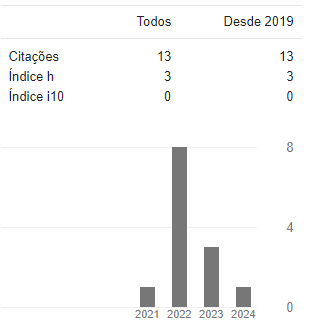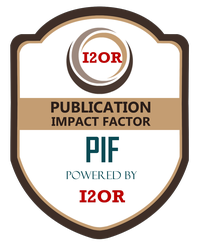Novos Biomarcadores Moleculares utilizados para o controle biológico de pragas
Visualizações: 555DOI:
https://doi.org/10.54038/ms.v4i2.50Palavras-chave:
Controle. Amilase. Palmeiras. Bruchinae. Pachymerus nucleorum.Resumo
As palmeiras fazem parte da Família botânica Arecaceae. Estas possuem uma grande importância econômica, principalmente por possuírem produtos destinados a alimentação, como também no abrigo, alimentação e reprodução de diversos animais, dentre eles os artrópodes. Attalea phalerata está distribuída em diversos estados brasileiros e seu comprimento varia entre 5-10m. Uma principal praga para esse tipo de palmeira são os insetos da sub-família Bruchinae. Os insetos possuem enzimas digestivas que os auxiliam na obtenção dos nutrientes, dentre elas estão as alfa-amilase. Na obtenção de alimento acabam destruindo as sementes, castanhas ou regiões da planta, que serviam como fonte econômica para a produção de óleos, carboidratos etc. O Pachymerus nucleorum, um exemplar dessa família de insetos, possui em uma de suas fases a larva, que cresce e se desenvolve através da assimilação da castanha das palmeiras. Com isso, o prejuizo econômico e muito alto. Nesse sentido o estudo e descoberta das pecularidades das enzimas digestivas desse inseto podem trazer beneficios para o controle biológico, sendo mais eficazes, simples e trazendo menores danos aos demais organismos. Dentre essas principais ferramentes de controle biológico temos os biomarcadores enzimático (amilase e ATPases) que pode possuir diferenças sutis entre os organismos.
Referências
Mayeux R. Biomarkers: Potential Uses and Limitations.
Zamora-Obando HR, Godoy AT, Amaral AG, de Mesquita AS, Simões BES, Reis HO, et al. MOLECULAR BIOMARKERS OF HUMAN DISEASE: FUNDAMENTAL CONCEPTS, RESEARCH MODELS AND CLINICAL APPLICATIONS. Quim Nova. 2022;45(9):1098–113.
Strimbu K, Tavel JA. What are biomarkers? Vol. 5, Current Opinion in HIV and AIDS. 2010. p. 463–6. DOI: https://doi.org/10.1097/COH.0b013e32833ed177
Díaz-Beltrán L, González-Olmedo C, Luque-Caro N, Díaz C, Martín-Blázquez A, Fernández-Navarro M, et al. Human plasma metabolomics for biomarker discovery: Targeting the molecular subtypes in breast cancer. Cancers (Basel). 2021 Jan 1;13(1):1–18. DOI: https://doi.org/10.3390/cancers13010147
Lacerda RF, Sena Romano IC. Available calcium levels in central nervous system for Arzenazo III method. GSC Advanced Research and Reviews. 2023 Jun 30;15(3):038–45. DOI: https://doi.org/10.30574/gscarr.2023.15.3.0167
Lacerda RF, Gonçalves da Silva A, Sena Romano IC. Neurodegeneration Processes Go Far Beyond Necrosis and Apoptosis! Multidisciplinary Sciences Reports. 2021;1(1):1–19. DOI: https://doi.org/10.54038/ms.v1i1.2
Shao Y, Ouyang Y, Li T, Liu X, Xu X, Li S, et al. Alteration of metabolic profile and potential biomarkers in the plasma of Alzheimer⇔s disease. Aging Dis. 2020 Nov 19;11(6):1459–70. DOI: https://doi.org/10.14336/AD.2020.0217
May PH, Anderson AB, Balick MJ, Frazão JMF. Subsistence benefits from the babassu palm (Orbignya martiana). Econ Bot. 1985;39(2). DOI: https://doi.org/10.1007/BF02907831
May PH, Anderson AB, Frazao JMF, Balick MJ. Agroforestry Systems 3. Vol. 2. 1985. DOI: https://doi.org/10.1007/BF00046960
Bezerra JA. Babaçu: as guerreiras do Mearin/mulheres de fibra. . Rev Globo Rural. 1999;14:38–45.
Veras De Carvalho A, Macedo JP. As guerreiras do babaçu: Mulheres quebradeiras de coco em movimento The babassu warriors: Female coconut breakers in motion Las guerreras del babaçu: Mujeres quebradoras de coco en movimiento. Estudos e Pesquisas em Psicologia. 2019;19(2):406–26. DOI: https://doi.org/10.12957/epp.2019.44281
Rocha Almeida R, audio Henrique Soares Del Menezzi C, Eterno Teixeira D. Utilization of the coconut shell of babac ßu( Orbignya sp.) to produce cement-bonded particleboard.
Pinheiro CUB, Frazão JMF. Integral processing of babassu palm (orbignya phalerata, arecaceae) fruits: Village level production in maranhāo, Brazil. Econ Bot. 1995;49(1). DOI: https://doi.org/10.1007/BF02862274
Rocha Almeida R, Henrique Soares Del Menezzi C, Eterno Teixeira D. Utilization of the coconut shell of babaçu (Orbignya sp.) to produce cement-bonded particleboard. Bioresour Technol. 2002;85(2). DOI: https://doi.org/10.1016/S0960-8524(02)00082-2
Emmerich FG, Luengo CA. Babassu charcoal: A sulfurless renewable thermo-reducing feedstock for steelmaking. Biomass Bioenergy. 1996;10(1). DOI: https://doi.org/10.1016/0961-9534(95)00060-7
Baruque Filho EA, da Graca A Baruque M, Sant’Anna GL. Babassu coconut starch liquefaction: an industrial scale approach to improve conversion yield. Bioresour Technol [Internet]. 2000;75(1):49–55. Available from: https://www.sciencedirect.com/science/article/pii/S0960852400000262 DOI: https://doi.org/10.1016/S0960-8524(00)00026-2
da Silva BP, Parente JP. An anti-inflammatory and immunomodulatory polysaccharide from Orbignya phalerata. Fitoterapia. 2001;72(8). DOI: https://doi.org/10.1016/S0367-326X(01)00338-0
Moraes MO, Fonteles MC, Moraes MEA, Machado MLL, Matos FJA. Screening for anticancer activity of plants from the Northeast of Brazil. Fitoterapia. 1997;68(3).
Vance-Harrop MH, De Gusmão NB, De Campos-Takaki GM. New bioemulsifiers produced by Candida lipolytica using D-glucose and babassu oil as carbon sources. Brazilian Journal of Microbiology. 2003;34(2). DOI: https://doi.org/10.1590/S1517-83822003000200006
Gombert AK, Pinto AL, Castilho LR, Freire DMG. Lipase production by Penicillium restrictum in solid-state fermentation using babassu oil cake as substrate. Process Biochemistry. 1999;35(1–2). DOI: https://doi.org/10.1016/S0032-9592(99)00036-9
Garcia AH, Rosa JAM, Costa MGG. Contribuição ao conhecimento do ataque do Pachymerus nucleorum fabr., 1792 (bruchidae-coleoptera) em Syagrus oleraceae mart. (Palmae). Anais da Escola de Agronomia e Veterinária. 1980;10(1).
The palms of the Amazon. Choice Reviews Online. 1995;33(02). DOI: https://doi.org/10.5860/CHOICE.33-0924
SANTOS EA dos. ; SSP da; FEJL; BJ de R; SLR. Flora de palmeiras do Horto Florestal de Rio Branco, Acre, Brasil. In: 61a Reunião Anual da SBPC. 2009.
Harri Lorenzi. Flora brasileira: Arecaceae (palmeiras). 2010.
FERREIRA EJLF. http://www.nybg.org/bsci/acre/www1/manual_palmeiras.html. Manual das palmeiras do Acre, Brasil.
Daly DC, Silveira M. Primeiro Catálogo da Flora do Acre, Brasil. EDITORA DA UNIVERSIDADE FEDERAL DO ACRE – EDUFAC. Rio Branco; 2008.
Pott A, Pott VJ, Sobrinho AAB. Plantas Úteis À Sobrevivência No Pantanal. IV Simpósio sobre Recurso Naturais e Sócio-econômico do Pantanal. 2004;
Lorenzi H. Arvores brasileiras: manual de identificacao e cultivo de plantas arboreas do Brasil. Vol. 2, Nova Odessa: Plantarum. 1998.
Santos GB dos, Marques MI, Adis J, Musis CR De. Artrópodos associados à copa de Attalea phalerata Mart. (Arecaceae), na região do Pantanal de Poconé, Mato Grosso, Brasil. Rev Bras Entomol. 2003;47(2). DOI: https://doi.org/10.1590/S0085-56262003000200010
Meik J, Dobie P. The ability of Zabrotes subfasciatus to attack cowpeas. Entomol Exp Appl [Internet]. 1986;42(2):151–8. Available from: https://onlinelibrary.wiley.com/doi/abs/10.1111/j.1570-7458.1986.tb01016.x DOI: https://doi.org/10.1111/j.1570-7458.1986.tb01016.x
Basset Y. Invertebrates in the canopy of tropical rain forests: How much do we really know? In: Plant Ecology. 2001. DOI: https://doi.org/10.1007/978-94-017-3606-0_8
Battirola LD, Adis J, Marques MI, Fábio E, Silva HO. Comunidade de Artrópodes Associada à Copa de Attalea phalerata Mart. (Arecaceae) durante o Período de Cheia no Pantanal de Poconé, MT Arthropod Community Associated with the Canopy of Attalea phalerata Mart. (Arecaceae) during the Flood Period of the Pantanal of Poconé, Mato Grosso, Brazil. Vol. 50, Psocoptera. 2007. DOI: https://doi.org/10.1590/S1519-566X2007000500002
Battirola LD, Marques MI, Adis J, Brescovit AD. Aspectos ecológicos da comunidade de Araneae (Arthropoda, Arachnida) em copas da palmeira Attalea phalerata Mart. (Arecaceae) no Pantanal de Poconé, Mato Grosso, Brasil. Rev Bras Entomol. 2004;48(3). DOI: https://doi.org/10.1590/S0085-56262004000300020
Dênis Battirola L, Marques MI, Adis J, Delabie JHC. Composição da comunidade de Formicidae (Insecta, Hymenoptera) em copas de Attalea phalerata Mart. Vol. 49, Revista Brasileira de Entomologia. 2005. DOI: https://doi.org/10.1590/S0085-56262005000100011
Dan C, And J, Siemens’ DH. BRUCHID GUILDS, HOST PREFERENCES, AND NEW HOST RECORDS FROM LATIN AMERICA AND TEXAS FOR THE GENUS STATOR BRIDWELL (COLEOPTERA: BRUCHIDAE). Vol. 49, The Coleopterists Bulletin. 1995.
Luiz Marsaro Júnior A, Maria Noemberg Lazzari S, Rodrigues Pinto Júnior A. INIBIDORES DE ENZIMAS DIGESTIVAS DE INSETOS-PRAGA. Revista Acadêmica: Ciência Animal. 2017;4(1). DOI: https://doi.org/10.7213/cienciaanimal.v4i1.9279
Franco OL, Rigden DJ, Melo FR, Grossi-de-Sá MF. Plant α-amylase inhibitors and their interaction with insect α-amylases: Structure, function and potential for crop protection. Vol. 269, European Journal of Biochemistry. 2002. DOI: https://doi.org/10.1046/j.0014-2956.2001.02656.x
Franco OL, Rigden DJ, Melo FR, Bloch C, Silva CP, Grossi De Sá MF. Activity of wheat α-amylase inhibitors towards bruchid α-amylases and structural explanation of observed specificities. Eur J Biochem. 2000;267(8). DOI: https://doi.org/10.1046/j.1432-1327.2000.01199.x
Meireles EA, Carneiro CNB, DaMatta RA, Samuels RI, Silva CP. Digestion of starch granules from maize, potato and wheat by larvae of the the yellow mealworm, tenebrio molitor and the Mexican bean weevil, Zabrotes subfasciatus. Journal of Insect Science. 2009;9. DOI: https://doi.org/10.1673/031.009.4301
Sari LT, Ribeiro-Costa CS, Valle PR, Pereira S. Aspectos biológicos de Zabrotes subfasciatus. Vol. 47, Revista Brasileira de Entomologia. 2003.
Janzen DH. Seed Predation by Animals. Annu Rev Ecol Syst. 1971;2(1). DOI: https://doi.org/10.1146/annurev.es.02.110171.002341
Janzen DH. Seed Predation by Animals Published by : Annual Reviews. Ecology. 2008;2(1971). DOI: https://doi.org/10.1146/annurev.es.02.110171.002341
Ernst WHO. Food consumption, life history and determinants of host range in the bruchid beetle Specularius impressithorax (Coleoptera: Bruchidae). J Stored Prod Res. 1993;29(1). DOI: https://doi.org/10.1016/0022-474X(93)90022-V
Gallo D, Nakano O, Silveira Neto S, Carvalho RPL, Baptista GC de, Berti Filho E, et al. Manual de entomologia agricola. Ceres; 1988.
González-Pérez SE, Coelho-Ferreira M, de Robert P, López Garcés CL. Knowledge and use of babassu (Attalea speciosa Mart. and Attalea eichleri (Drude) A.J. Hend.) among Mebengokrekayapó from Las Casas Indigenous Land, Pará state, Brazil. Acta Bot Brasilica. 2012;26(2):295–308. DOI: https://doi.org/10.1590/S0102-33062012000200007
Jongsma MA, Bolter C. The adaptation of insects to plant protease inhibitors. Vol. 43, Journal of Insect Physiology. 1997. DOI: https://doi.org/10.1016/S0022-1910(97)00040-1
Lemos FJA, Campos FAP, Silva CP, Xavier‐Filho J. Proteinases and amylases of larval midgut of Zabrotes subfasciatus reared on cowpea (Vigna unguiculata) seeds. Entomol Exp Appl. 1990;56(3). DOI: https://doi.org/10.1111/j.1570-7458.1990.tb01400.x
Marshall JJ, Lauda CM. Purification and properties of phaseolamin, an inhibitor of α amylase, from the kidney bean, Phaseolus vulgaris. Journal of Biological Chemistry. 1975;250(20). DOI: https://doi.org/10.1016/S0021-9258(19)40811-9
Yamada T, Hattori K, Ishimoto M. Purification and characterization of two α-amylase inhibitors from seeds of tepary bean (Phaseolus acutifolius A. Gray). Phytochemistry [Internet]. 2001;58(1):59–66. Available from: https://www.sciencedirect.com/science/article/pii/S0031942201001789 DOI: https://doi.org/10.1016/S0031-9422(01)00178-9
Guzmán Maldonado SH, Marín-Jarillo A, Castellanos JZ, González De Mejía E, Acosta-Gallegosc JA. Relationship between physical and chemical characteristics and susceptibility to Zabrotes subfasciatus (Boh.) (Coleoptera:Bruchidae) and Acanthoscelides obtectus (Say) in common bean (Phaseolus vulgaris L.) varieties. J Stored Prod Res. 1996;32(1). DOI: https://doi.org/10.1016/0022-474X(95)00037-8
Macedo MLR, das Graças Machado Freire M, Novello JC, Marangoni S. Talisia esculenta lectin and larval development of Callosobruchus maculatus and Zabrotes subfasciatus (Coleoptera: Bruchidae). Biochimica et Biophysica Acta (BBA) - General Subjects [Internet]. 2002;1571(2):83–8. Available from: https://www.sciencedirect.com/science/article/pii/S0304416502001551 DOI: https://doi.org/10.1016/S0304-4165(02)00155-1
Doss RP, Oliver JE, Proebsting WM, Potter SW, Kuy S, Clement SL, et al. Bruchins: Insect-derived plant regulators that stimulate neoplasm formation. Proc Natl Acad Sci U S A. 2000;97(11). DOI: https://doi.org/10.1073/pnas.110054697
Said Suraia ed., Pietro Rosemeire Cristina Linhari Rodrigues ed. Enzimas como agentes biotecnológicos. 2004.
Janeček Š. α-Amylase family: Molecular biology and evolution. Vol. 67, Progress in Biophysics and Molecular Biology. 1997. DOI: https://doi.org/10.1016/S0079-6107(97)00015-1
Machius M, Declerck N, Huber R, Wiegand G. Activation of Bacillus licheniformis α-amylase through a disorder → order transition of the substrate-binding site mediated by a calcium-sodium-calcium metal triad. Structure. 1998;6(3). DOI: https://doi.org/10.1016/S0969-2126(98)00032-X
Machius M, Wiegand G, Huber R. Crystal structure of calcium-depleted Bacillus licheniformis α-amylase at 2.2 Å resolution. J Mol Biol. 1995;246(4). DOI: https://doi.org/10.1006/jmbi.1994.0106
Krause M, Kiema TR, Neubauer P, Wierenga RK. Crystal structures of two monomeric triosephosphate isomerase variants identified via a directed-evolution protocol selecting for l-arabinose isomerase activity. Acta Crystallographica Section F [Internet]. 2016;72(6):490–9. Available from: https://onlinelibrary.wiley.com/doi/abs/10.1107/S2053230X16007548 DOI: https://doi.org/10.1107/S2053230X16007548
Friedmann T, Epstein CJ. The role of calcium in the reactivation of reduced Taka-amylase. Journal of Biological Chemistry. 1967;242(21). DOI: https://doi.org/10.1016/S0021-9258(18)99485-8
Saboury AA, Karbassi F. Thermodynamic studies on the interaction of calcium ions with alpha-amylase. Thermochim Acta. 2000;362(1–2). DOI: https://doi.org/10.1016/S0040-6031(00)00579-7
Sajedi RH, Naderi-Manesh H, Khajeh K, Ahmadvand R, Ranjbar B, Asoodeh A, et al. A Ca-independent α-amylase that is active and stable at low pH from the Bacillus sp. KR-8104. Enzyme Microb Technol. 2005;36(5–6). DOI: https://doi.org/10.1016/j.enzmictec.2004.11.003
Wanderley KJ, Torres FAG, Moraes LMP, Ulhoa CJ. Biochemical characterization of α-amylase from the yeast Cryptococcus flavus. FEMS Microbiol Lett. 2004;231(2). DOI: https://doi.org/10.1016/S0378-1097(03)00955-8
Linden A, Mayans O, Meyer-Klaucke W, Antranikian G, Wilmanns M. Differential regulation of a hyperthermophilic α-amylase with a novel (Ca,Zn) two-metal center by zinc. Journal of Biological Chemistry. 2003;278(11). DOI: https://doi.org/10.1074/jbc.M211339200
Nonaka T, Fujihashi M, Kita A, Hagihara H, Ozaki K, Ito S, et al. Crystal Structure of Calcium-free α-Amylase from Bacillus sp. Strain KSM-K38 (AmyK38) and Its Sodium Ion Binding Sites. Journal of Biological Chemistry. 2003;278(27). DOI: https://doi.org/10.1074/jbc.M212763200
Silva CP, Terra WR, Xavier-Filho J, Grossi De Sá MF, Lopes AR, Pontes EG. Digestion in larvae of Callosobruchus maculatus and Zabrotes subfasciatus (Coleoptera: Bruchidae) with emphasis on α-amylases and oligosaccharidases. Vol. 29, Insect Biochemistry and Molecular Biology. 1999. DOI: https://doi.org/10.1016/S0965-1748(99)00010-7
Campos FAP, Xavier-Filho J, Smva CP, Ary MB. RESOLUTION AND PARTIAL CHARACTERIZATION OF PROTEINASES AND ~-AMYLASES FROM MIDGUTS OF LARVAE OF THE BRUCHID BEETLE CALLOSOBRUCHUS MACULATUS (F.). Vol. 9211, Biochem. Physiol. 1989. DOI: https://doi.org/10.1016/0305-0491(89)90312-X
Komoszyński M, Wojtczak A. Apyrases (ATP diphosphohydrolases, EC 3.6.1.5) : Function and relationship to ATPases. Vol. 1310, Biochimica et Biophysica Acta - Molecular Cell Research. 1996. DOI: https://doi.org/10.1016/0167-4889(95)00135-2
Vale RD, Goldstein LSB. One motor, many tails: An expanding repertoire of force-generating enzymes. Vol. 60, Cell. 1990. DOI: https://doi.org/10.1016/0092-8674(90)90334-B
Schliwa M, Woehlke G. Molecular motors. Nature [Internet]. 2003;422(6933):759–65. Available from: https://doi.org/10.1038/nature01601 DOI: https://doi.org/10.1038/nature01601
Mermall V, Post PL, Mooseker MS. Unconventional myosins in cell movement, membrane traffic, and signal transduction. Vol. 279, Science. 1998. DOI: https://doi.org/10.1126/science.279.5350.527
Hirokawa N, Noda Y, Okada Y. Kinesin and dynein superfamily proteins in organelle transport and cell division. Curr Opin Cell Biol. 1998;10(1). DOI: https://doi.org/10.1016/S0955-0674(98)80087-2
Karcher RL, Deacon SW, Gelfand VI. Motor -cargo interactions: The key to transport specificity. Vol. 12, Trends in Cell Biology. 2002. DOI: https://doi.org/10.1016/S0962-8924(01)02184-5
Kim AJ, Endow SA. A kinesin family tree. J Cell Sci. 2000;113(21). DOI: https://doi.org/10.1242/jcs.113.21.3681
Reddy VS, Reddy ASN. The calmodulin-binding domain from a plant kinesin functions as a modular domain in conferring Ca2+-calmodulin regulation to animal plus- and minus-end kinesins. Journal of Biological Chemistry. 2002;277(50). DOI: https://doi.org/10.1074/jbc.M205459200
Karki S, Holzbaur EL. Cytoplasmic dynein and dynactin in cell division and intracellular transport. Curr Opin Cell Biol. 1999;11(1). DOI: https://doi.org/10.1016/S0955-0674(99)80006-4
Dynein: A protein with adenosine triphosphatase activity from cilia. Science (1979). 1965;149(3682). DOI: https://doi.org/10.1126/science.149.3682.424
Sellers JR. Myosins: A diverse superfamily. Vol. 1496, Biochimica et Biophysica Acta - Molecular Cell Research. 2000. DOI: https://doi.org/10.1016/S0167-4889(00)00005-7
Hasson T, Mooseker MS. Vertebrate unconventional myosins. Vol. 271, Journal of Biological Chemistry. 1996. p. 16431–4. DOI: https://doi.org/10.1074/jbc.271.28.16431
Cunha VMN, de Souza W, Noël F. A Ca2+ -stimulated, Mg2+ -dependent ATPase activity in subcellular fractions from Schistosoma mansoni. FEBS Lett. 1988;241(1–2). DOI: https://doi.org/10.1016/0014-5793(88)81032-9
Al-Fifi ZIA, Marshall SL, Hyde D, Anstee JH, Bowler K. Characterization of ATPases of apical membrane fractions from Locusta migratoria Malpighian tubules. Insect Biochem Mol Biol. 1998;28(4). DOI: https://doi.org/10.1016/S0965-1748(98)00025-3
Hans Merzendorfer WRHHW. Sense and antisense RNA for the membrane associated 40 kDa subunitM40 of the insect V-ATPase. FEBS Lett. 1997; DOI: https://doi.org/10.1016/S0014-5793(97)00699-6
Pullikuth AK, Gill SS. Identification of a Manduca sexta NSF ortholog, a member of the AAA family of ATPases. Gene. 1999;240(2). DOI: https://doi.org/10.1016/S0378-1119(99)00441-2
Ping G, Yanping L, Shigui L. Effects of dp-B on ATPase activity of insect plasma membrane. Pestic Biochem Physiol. 2004;80(3). DOI: https://doi.org/10.1016/j.pestbp.2004.07.003
Downloads
- PDF (English) 225
Publicado
Como Citar
Edição
Seção
Accepted 2024-07-09
Published 2024-07-18














